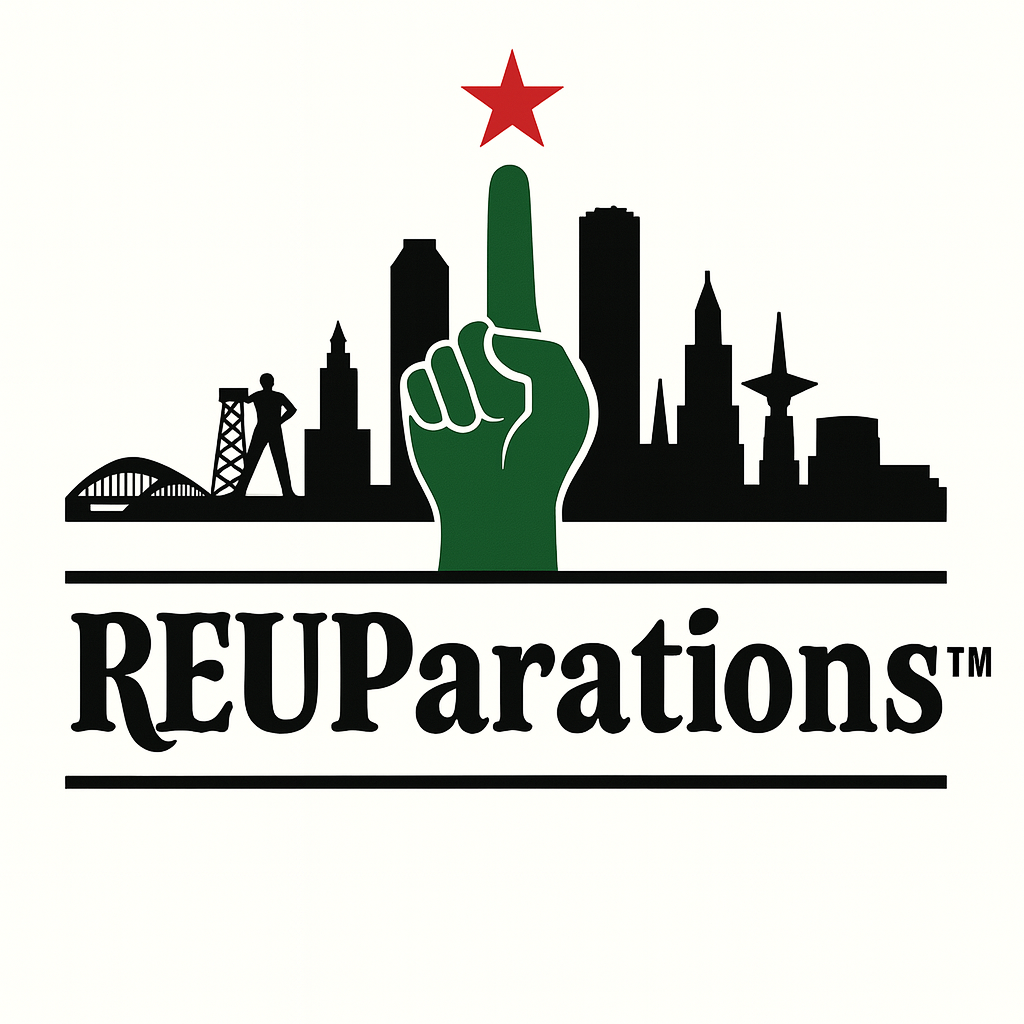The REUParations Gap™
Grow from memory. Align with purpose. Protect the re-up.
Black joy is the re-up.
1. Why This Page Exists
We didn’t create REUParations™ to get people high. We created it to raise the vibration. To restore culture, not consume it. To heal the damage of prohibition while refusing to repeat it in luxury packaging.
Cannabis in Oklahoma has exploded into a billion-dollar industry. But accountability has not kept pace. The market is saturated with product but starved of purpose. And the more edible the industry becomes, the less digestible its history becomes.
The REUParations Gap™ is the space between what cannabis could be… and what it currently is. We are here to name that space. Not escape it.
2. Why We Say Cannabis — Not Marijuana
The word “marijuana” didn’t originate in science — it originated in propaganda.
In the 1930s, Harry Anslinger, head of the Federal Bureau of Narcotics, led a national campaign that painted cannabis as a dangerous drug used primarily by Black Americans and Mexican immigrants. The word “marijuana” was intentionally selected to sound foreign and threatening to white Americans, making it easier to demonize and criminalize both the plant and the communities associated with it. source: History.com
Anslinger’s policies fueled early federal prohibition laws and laid the foundation for decades of racially-biased drug enforcement. His efforts helped pass the Marihuana Tax Act of 1937, which marked the beginning of cannabis criminalization in the United States.
At REUParations™, we reject that legacy. We use the term cannabis — not marijuana — because language is policy, and policy is always personal.
3. What You Deserve to Know About This Industry
Not every cannabis product is created for your healing. Not every dispensary cares about your recovery. And not every producer wants you to feel empowered, informed, or in control.
Some want you addicted. Some want you impulsive. Some want you numb — because your fog is their profit model.
REUParations™ is not built on guilt, hustle, or hype. We design cannabis confections with clarity in mind. Our cake bars are slow. Intentional. Whole. Built to reintroduce ceremony — not trigger compulsive consumption.
We don’t shame people who use cannabis to cope. We do ask: is the product you’re using helping you heal... or helping someone else keep you distracted?
4. Cannabis Legalization Without Reparations Is a Lie
Legalization should have been a turning point. Instead, it’s become a mirror — showing us how structural injustice just shapeshifts into profit.
According to a 2020 report from the ACLU, Black people are 3.6 times more likely than white people to be arrested for cannabis possession, despite nearly equal usage rates. In many counties across Oklahoma, that racial disparity is even more extreme. source: ACLU
At the same time, the cannabis industry is overwhelmingly white-owned. As of 2021, fewer than 2% of cannabis businesses were Black-owned, while the majority of licensing and profits flow to white entrepreneurs. source: Leafly Equity Report
This is not equity. This is extraction.
Black men are still serving time for doing what others now advertise on billboards. Meanwhile, their communities — the same ones devastated by cannabis prohibition — are rarely included in legalization's profits or planning.
5. What You Should Be Asking in Oklahoma
We aren’t naming names in this piece. But we are naming patterns.
Consumers deserve to know who is producing their cannabis. Not just what’s in the product — but who’s behind it. What do they stand for? Where did they come from? Are they building community, or extracting from it? Are they feeding a deeper culture... or just feeding off yours?
In Oklahoma City and Tulsa, we’ve seen firsthand how some producers may be able to form monopolies, control testing access, and flood the market — not necessarily with intention, but with volume. We believe that consumers have the right to question the motives, values, and ethics of local producers — especially when those producers hold power in how cannabis is distributed, tested, and consumed.
Ask more. Consume slower. Protect your peace like it’s part of your inheritance — because it is.
6. Who We Are
REUParations™ is not a marketing gimmick. It is a cultural intervention.
We are creatives, visionaries, and survivors. We know what it’s like to turn to cannabis out of desperation. We also know the potential it holds when treated with respect, ritual, and reverence. We aren’t selling fast highs — we’re offering slow power.
We are Black-owned, Oklahoma-rooted, and spiritually driven. Our mission is to make cannabis not just legal, but liberating.
We do not believe in consumer dependency. We believe in reparative indulgence. That means crafting experiences that feel safe, sovereign, and culturally aligned. That means asking hard questions — and being willing to answer them, too.
7. Closing Reflection
This is personal. It always will be.
We didn’t build REUParations™ to compete with the cannabis market. We built it to correct it.
Cannabis can be a tool of freedom — or a trap disguised as therapy. It depends who’s holding it. It depends what they want from you.
We want your joy. We want your clarity. We want your whole self back.
Because the re-up isn’t just about restocking — it’s about restoration.
“Black joy is the re-up.”
—
Terrard D. Robinson
Creative Director, REUParations™






